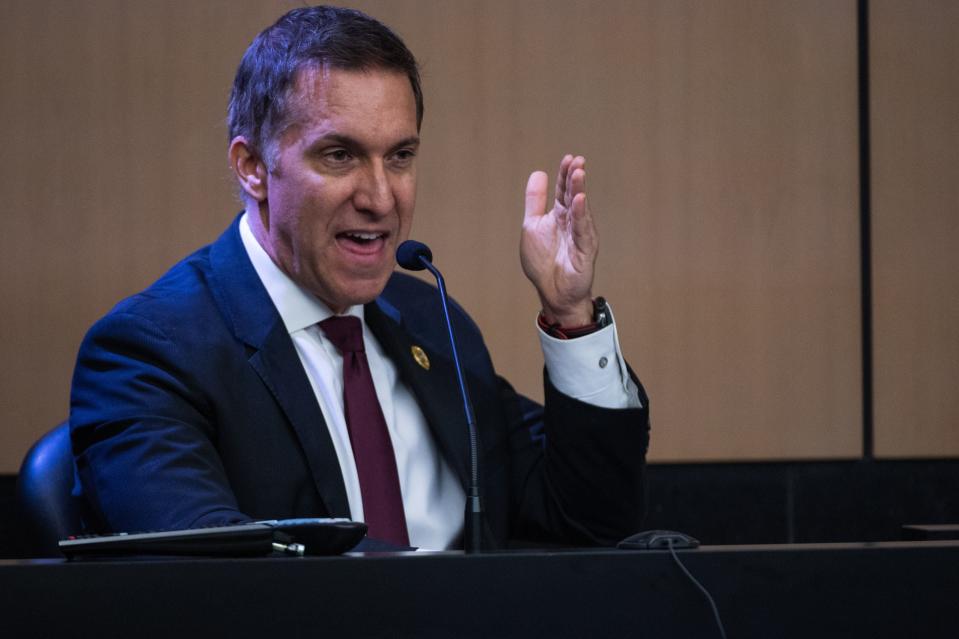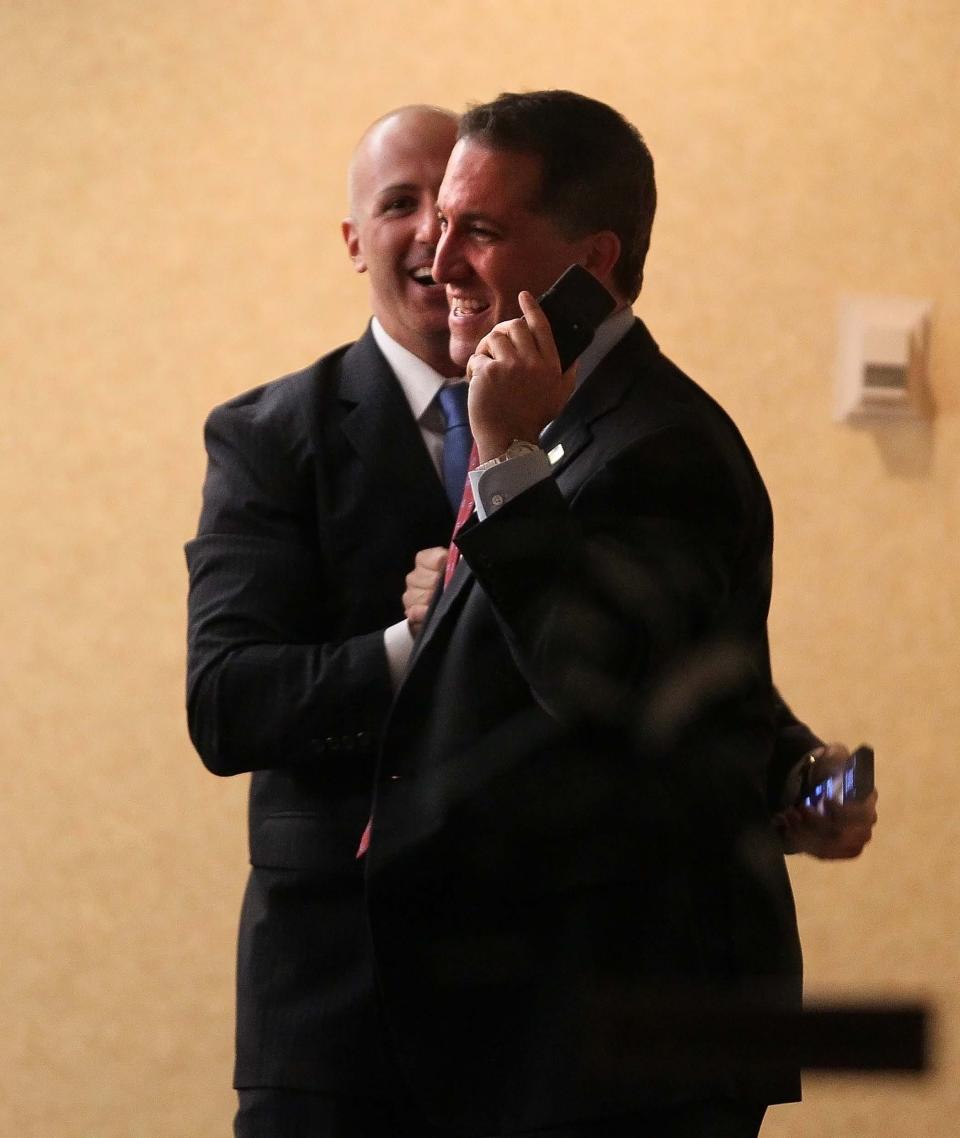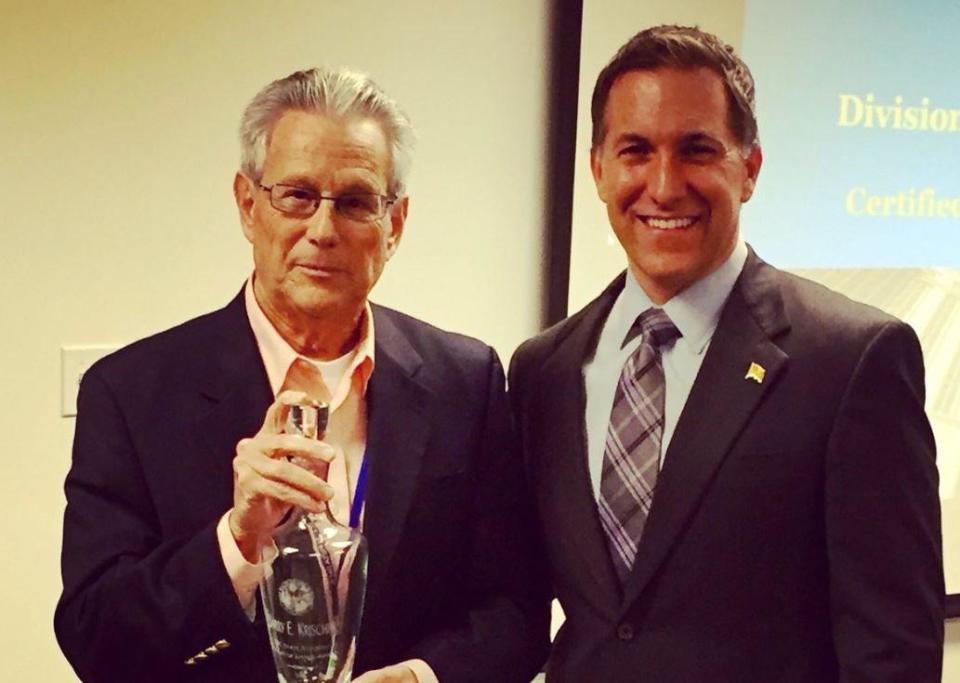Aronberg appeals ruling in Jeffrey Epstein case, still saying Post's lawsuit was frivolous
- Oops!Something went wrong.Please try again later.
Palm Beach County State Attorney Dave Aronberg is appealing a judge's ruling denying legal fees for his lawyer and sanctions against The Palm Beach Post's attorneys for seeking the truth behind a 2006 grand jury that dubbed serial sexual predator Jeffrey Epstein little more than a "john" and labeled his underage victims prostitutes.
Aronberg's appeal is over a lawsuit he said was filed by The Post only to humiliate him. He has sought at least $70,000 in legal fees, claiming that he wants to recoup taxpayer money. But taxpayers won't ever be financing his lawyer. The attorney doesn't get any money unless a judge orders The Post to pay him.
Read The Post's 2019 investigation: Jeffrey Epstein case, the first failure: To the first prosecutors, Epstein's victims were prostitutes
Now Aronberg is taking the issue to the Fourth District Court of Appeal, which in May told the lower court judge to review the grand jury material for release "in furtherance of justice" as a result of The Post's nearly four-year-long court case. Trial Judge Luis Delgado is doing that now.
"The trial judge ruled for State Attorney Aronberg on the substance of the case," the state attorney's office said in a statement. "He denied our sanctions motion only on procedural grounds, which we believe will be corrected on appeal. We believe the Palm Beach Post will be held accountable for its frivolous lawsuit to obtain records the newspaper knew we never possessed."
The Post seeks to make public what happened during the secret 2006 proceedings to see how then-State Attorney Barry Krischer torpedoed his own case against Epstein. Only one victim testified, and the prosecutor hauled out her social-media pages to undermine her, a Post investigation, "Jeffrey Epstein: the first failure," found in 2019.
"While it is clear that Jeffrey Epstein's 2008 deal with the State of Florida was not consistent with the evidence gathered against him, what remains shrouded in mystery," the lawsuit reads, "is how the evidence was presented — the extent to which it was presented — to the grand jury that returned an indictment far more limited in scope than expected and deserved."
How did the Jeffrey Epstein grand jury come up with only one prostitution charge - no reflection of multiple girls, their ages?

The grand jury indicted Epstein on one count of solicitation of prostitution — what a person might face after approaching an adult sex worker. Was evidence found by Palm Beach police of multiple underage girls telling similar stories of what happened at Epstein's Palm Beach mansion even brought up? The only witness was a 14-year-old girl, but the charge does not reflect her age. How extensive was the attempt by prosecutors to discredit her, their own witness?
Aronberg testified in a September hearing that the Epstein suit was part of a long campaign by The Post to make him look bad. The Post, in its constitutional role as a watchdog over government, has investigated Aronberg over the years in his role as one of the most powerful officials in the county.
More: Dave Aronberg: Post's suit to unseal Jeffrey Epstein documents meant only to humiliate me
Post Executive Editor Rick Christie has called Aronberg's claims about the Epstein lawsuit "ludicrous."
"The Jeffrey Epstein case was, and remains, one of the most heinous in our county's history. The Post continues to pursue the facts of that tragic story about the victimization of teenage girls without malice in order to bring those facts into the light."
“The Palm Beach Post has spent 12 years attacking me,” Aronberg testified in September. “They published many hundreds of articles. … It continues to this day.”
More: Jeffrey Epstein: Judge receives 2006 grand jury materials in Palm Beach Post lawsuit
Why The Post sued to make Epstein grand jury proceedings public
The newspaper and its attorneys say they did not file the Epstein lawsuit to attack Aronberg.
The newspaper wanted to know whether Krischer, who had left office three years before Aronberg was elected, "abused his authority by using material from a defense attorney to undermine a witness he called to testify before the grand jury," Post attorney Stephen Mendelsohn of the Greenberg Traurig law firm testified.
Months before the grand jury met, famed Harvard law professor Alan Dershowitz, who was part of Epstein's defense team, had rained down on Krischer's office page after page of the victims' social media postings. One grand jury session was canceled so Krischer and his prosecutors could examine the posts.
More: State attorney drops objection to releasing secret Epstein documents
Aronberg and then-Palm Beach County Clerk & Comptroller Sharon Bock were named as defendants in their official capacities in The Post's lawsuit, which was filed in 2019, because their offices may have held the grand jury materials. Also, Aronberg's office is responsible for grand juries, and he could have voiced his position on the release of the material.
“I voted for Mr. Aronberg. I have no animus against him,” said Mendelsohn. “This was a sober decision to sue someone in their official capacity. We took pains to make sure we weren’t accusing him of any wrongdoing at any time.”
Aronberg said later under oath that he didn't have the materials. The clerk's office does store them.
Aronberg, Abruzzo opposed releasing the grand jury transcripts

Aronberg and Bock's successor, Joseph Abruzzo, vigorously opposed the release of the material in court. Abruzzo hired the law firm that represented Sarah Palin against The New York Times, and Aronberg tapped Douglas Wyler, an Amelia Island attorney, on a contingency basis, meaning he doesn't get paid if he doesn't win.
Aronberg and Abruzzo both said later that they did not oppose the release of the material, but Abruzzo's attorney continued to do so in front of the appeals court. Abruzzo also is seeking attorney's fees and sanctions but hasn't pursued the motion.
Once Aronberg declared under oath that he didn't have the materials and that he wouldn't oppose The Post going forward, the newspaper dropped him as a defendant.
Even the judge who ruled against The Post said its arguments were 'strong'
When someone has to defend themselves against a frivolous lawsuit, the judge can order their legal fees be paid by the opposing party and impose sanctions against the opposing lawyers.
But both the lower court judge and the Fourth DCA indicated that The Post's lawsuit wasn't reckless.
Circuit Judge Donald Hafele said The Post had "strong arguments" but that he was not legally empowered to release the transcripts.
More: Palm Beach County clerk seeks to punish Post for pursuing Jeffrey Epstein records
"It may well be that the disclosure of (Epstein’s) grand jury records could reveal that fair treatment did not occur and that (Epstein) might have escaped appropriate punishment through some failing of our justice system," Hafele wrote.
The Fourth DCA has ordered Delgado, who replaced Hafele in the suit, to review and decide which materials could be released "in furtherance of justice," the tenet in state law under which The Post sued.
Delgado in January ruled against Aronberg on whether he properly followed a procedure to give The Post notice that he was seeking attorneys fees and sanctions. Now he's appealing.
Why did Jeffrey Epstein get to sexually abuse underage girls for 13 more years after he was charged here?

The case started In Palm Beach County in 2006 and could have ended here. But Palm Beach Police Chief Michael Reiter, after his detective found multiple girls detailing sexual abuse by Epstein, was so concerned about Krischer's handling of the prosecution that he asked the FBI and federal prosecutors to get involved.
Federal prosecutors and Krischer would negotiate state prostitution charges that Epstein would go on to plead guilty to in 2008. One was the solicitation charge from the grand jury and the other was soliciting a minor under age 18 for prostitution. In doing so, Epstein had to register as a sex offender, but he escaped a 53-page federal indictment that could have put him behind bars for decades.
More: Appeals court opens way to judge's review of Epstein grand jury transcripts
Thus the "deal of the century" saga began with victims being denied justice nearly every step of the way and likely many more victimized before Epstein was finally stopped in 2019 and arrested on sex trafficking charges, 13 years after the Palm Beach County indictment.
Less than a month later, he was found hanged in the Manhattan jail. The medical examiner ruled it a suicide.
This article originally appeared on Palm Beach Post: Jeffrey Epstein lawsuit: Dave Aronberg appeals ruling

